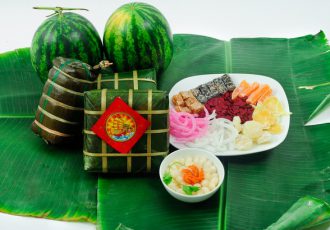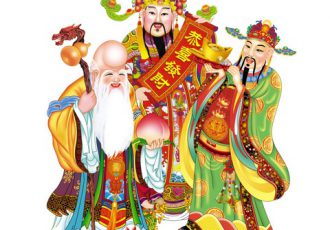History of watermelon: During the dynasty of the 8th Hung king, many foreign merchants arrived in the southern kingdom. They presented the king with a number of exotic goods and also offered to buy a young boy they had taken from an island in the Lothian Seas.
The king took pity on the child and kept him in his court. The child amazed everyone with his intelligence and abilities. Immediately he learned the Vietnamese language. The king gave him the very honourable name of An Tiem and eventually gave him his own daughter to marry.

This privilege did not fail to arouse the resentment and envy of the court mandarins. They were looking for an opportunity to blacken An Tiem in the eyes of the king. Meanwhile, An Tiem lived with the princess and the two young children she had given him in a beautiful house close to the royal palace. He did not care about the intrigues of the mandarins. He remained indifferent to the hateful looks they gave him, and when his wife warned him against them, he was content to reply in a calm tone of voice: “My life and all my possessions, I owe to Heaven….
One day, one of these mandarins overheard their conversation. The latter went to the palace and asked the king for an audience. He stuttered before the king: “I have heard with my own ears your worthy servant An Tiem, whom you have, however, in your magnanimity, covered with honours and largesse, affirm that he owes you nothing. Everything he owns. He claims. He received it from Heaven as a reward for his merits…” the king choked with fury. He called his guards and ordered them to bring An Tiem before his council.
“Ungrateful!” the king began: “I have only one question for you: ‘Tell me to whom you owe all that you have!”
“In Heaven,” A Tiem replied without malice. The king had An Tiem thrown into prison and then gathered his ministers and counsellors to decide on the punishment to be meted out to him. Then the eldest of the advisers spoke up: “Your grace,” he said, “it is obvious that An Tiem has shown you disrespect and gratitude. This is a crime of lèse-majesté. But there is no evidence of a conspiracy. Since he claims that he owes everything to Heaven, let Heaven decide his fate. Send him to a desert island, and we shall see whether it is written whether he shall live or die.
When the princess heard of the judgment, she threw herself at her father’s feet and begged him through her tears to let her and her children accompany her husband into exile. The king had to give his consent.
An Tiem set off to explore the island, looking for bird eggs, roots and edible plants to feed on. Suddenly, he noticed a white pheasant circling the island three times before dropping six shiny black seeds in its beak. An Tiem picked them up and sowed them. The seeds were carefully watered and soon germinated.
Soon the green shoots began to bear flowers, from which large, round, dark-green fruits emerged. When they were as big as a man’s head. An Tiem picked one and sliced it. How sweet and refreshing the juicy flesh seemed to them! He continued to sow all the resulting seeds, tended them and watered them. It was not long before the whole island became a watermelon field! After a few years, An Tiem became a wealthy and respected man again, trading watermelons for rice and other useful items with junks from far away. One day, An Tiem had the idea of picking a large number of watermelons and engraving his name on their smooth rind. Then he entrusted the round fruits to the foaming waves. Some fishermen found one of his balls on the beach and brought their strange find to the king.
The king recognised An Tiem’s name and had him brought back with great pomp and ceremony and reinstated in his functions. The unfortunate mandarin, however, was severely punished.



